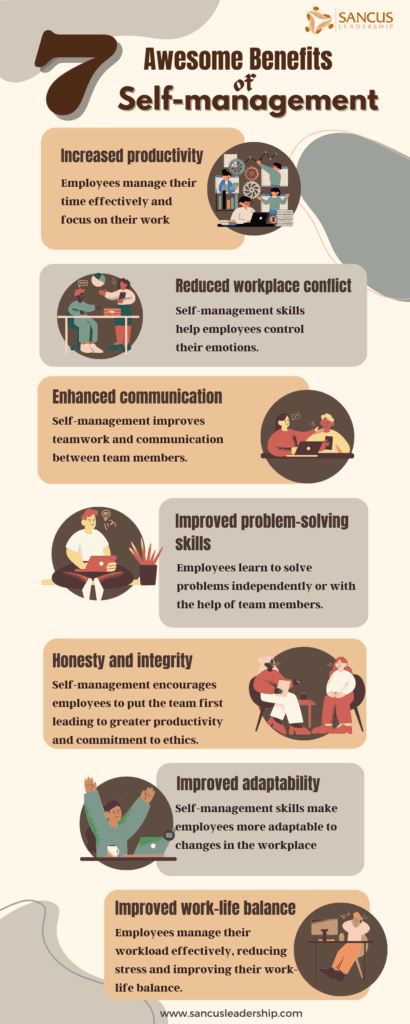The true sign of an effective team is that it can reach synergies, or as Aristoteles told it, “The whole is greater than the sum of its parts.” An individual unable to pull their weight slows down the group. Conversely, a self-managed team member, especially the leader, can motivate a team to outperform its sum potential.
Self-management skills are essential to increase productivity, reduce workplace conflict, and enhance communication between team members. Such skills improve problem-solving and employee adaptability and promote honesty and integrity. They also help workers establish a better work-life balance.
This post will show why, as a leader, you should prioritize the development of self-management skills.
How Self-Management Skills Benefit Employees and Employers

The leader is responsible for managing a team. Ultimately, people will celebrate or criticize the leader depending on the success or failure of a group. However, a leader can only do so much.
Micromanagement is generally frowned upon and is usually more harmful than beneficial, so the employees must be their own bosses while working towards the team’s goals.
Micromanagement is generally frowned upon and is usually more harmful than beneficial, so the employees must be their own bosses while working towards the team’s goals.

Increased Productivity
After strategizing as a group and assigning tasks, employees step into their workspaces to execute their assignments. The manager expects the employee to work with minimal supervision within the time frame provided. When left unsupervised, an individual’s success depends on their self-management skills.
A crucial self-management skill is time management. Employees should evaluate their workload appropriately, divide it into sections, and assign enough time to every task.
A pro tip is to start with plotting the deadline on the calendar, then add some spare time in case something goes wrong, and from there, schedule tasks moving back in time.
By doing so, the employees make optimum use of every minute and reduce the likelihood of multitasking. Multitasking is an enemy of quality and productivity because switching between tasks takes energy from the brain.
Multitasking is an enemy of quality and productivity because switching between tasks takes energy from the brain.
Through time management, employees increase the likeliness of meeting deadlines, enabling the group’s progression. The team can’t move forward on sequentially set-up projects if completing a task lags.
Tasks can be seen like cogs in a machine; if one cog fails or falls out of alignment, the machine malfunctions.
Tasks can be seen like cogs in a machine, and if one cog fails or falls out of alignment, the machine malfunctions.
If every employee manages their time as expected, productivity increases. Through self-management, employees adhere to timelines set by the team, ensuring that the group meets its goals within the specified time frames.
Another pro tip; in the military, timing is often vital (literally) and sometimes even more vital than task performance.
One thing I have learned as a leader is to clearly communicate what aspect of the task is the most important. Is it completing the task to a high standard or to a lower standard but on time?
Leading employees with self-management skills are easy as you are confident everyone will perform as expected.
Reduced Workplace Conflict
Workplace conflicts are inevitable and vital for a team’s success. No matter how cohesive the team is, the members are bound to and should have differences of opinion. The individuals’ ability to control their emotions determines if the conflict will be constructive or destructive to the team’s overall development.
Emotional control is an important factor of self-management. A condescending reply to a work email or in a Slack channel can raise tensions between employees.
Trivial quarrels at work are sometimes escalated into huge issues by employees who can’t control their emotions. The tension created negatively affects productivity and erodes trust and teamwork.
Self-management involves guiding your physical and mental being toward a valuable and positive path. Emotions from home shouldn’t (but most likely will, since we are humans) overly disturb the workplace or affect a team member’s output.
Self-management involves guiding your physical and mental being toward a valuable and positive path.
Leaders can help their employees improve emotional control by introducing stress education. It helps improve employees’ mental health and their ability to control emotions.
Enhanced Communication Between Team Members
Self-management improves teamwork as team members know when to consult each other.
Self-management encourages individuals to identify their strengths and weaknesses. When they understand that their shortcomings will interfere with the execution of a particular task, the employee is self-aware enough to inform the team and seek help.
Through clear intra-employee communication, leading also becomes easier since issues tend to get solved at the lowest possible level.
Improved Problem-Solving Skills
Daily, employees face unexpected challenges requiring them to make decisions without seeking help. Some of these choices can profoundly impact the group.
Self-management empowers an employee to determine when to solve problems individually and when to ask for help from the leader or other team members. It guarantees effectiveness within the team.
The reality of great teamwork is that sometimes, you have to trust your team members to solve individual problems. You can only preside over some of your team’s decisions, even in a small group of two to ten members.
It Guarantees Honesty and Integrity
Trust is a crucial group dynamic. It’s easier to trust employees who are honest and demonstrate integrity.
Employees shoulder various responsibilities within the group. For the group to succeed, the employee must honestly report their performance. Furthermore, they must perform their tasks with integrity and harmonize the group’s interests with their self-interests.
Honesty and integrity stem from self-management. Through self-management, the employees learn to put the team first, leading to greater productivity.
Honesty and integrity stem from self-management. Through self-management, the employees learn to put the team first, leading to greater productivity.
In my experience, employees with stellar self-management skills will likely refrain from stealing from the company or cutting corners to complete tasks faster. They demonstrate commitment to ethics and the company’s goals.
Improved Adaptability
The ability to adapt to change is vital to the success of a group. For example, the businesses that modified their workplaces faster following the 2020 pandemic were less affected by the anomaly.
Many businesses require their employees to work remotely. Due to adaptability, employees and supervisors with self-management skills switched to the new work mode faster.
Change in the workplace is inevitable. Therefore, for an employee to survive, they need to adapt to evolving work conditions. As an employer, you want workers who can adapt to changes quickly.
Improved Work-Life Balance
Work-life balance is a much-discussed topic as employers explore ways to improve the overall lives of their employees.
Before measures like the 4-day workweek (a fascinating book) gain widespread adoption, employees can improve their work-life balance through self-management skills. Separating work and life is easy for someone who understands time management. By managing your workload and meeting deadlines, you can free up time for yourself, your family, and your friends.
Employees and employers who can balance work and personal lives are happier and more productive.
Here is Doug Kirkpatrick, author of Beyond Empowerment: The Age of the Self-Managed Organization, giving a TED talk on how to empower organizations through self-management.
| Benefit | Description |
| Increased productivity | Employees manage their time effectively and focus on their work, reducing the likelihood of multitasking and missed deadlines. |
| Reduced workplace conflict | Self-management skills help employees control their emotions, reducing the likelihood of conflicts that affect productivity. |
| Enhanced communication | Self-management improves teamwork and communication between team members, making leading easier. |
| Improved problem-solving skills | Employees learn to solve problems independently or with the help of team members, leading to a more effective team. |
| Honesty and integrity | Self-management encourages employees to put the team first, leading to greater productivity and commitment to ethics. |
| Improved adaptability | Self-management skills make employees more adaptable to changes in the workplace, leading to a more resilient team. |
| Improved work-life balance | Employees manage their workload effectively, reducing stress and improving their work-life balance. |
Conclusion
Self-management skills are vital to the success of any business. They motivate employees and employers to perform their best, work together more effectively, and avoid conflict.
Self-management comes naturally to some employees, but others have to learn. One way to teach employees self-management is by leading by example. If you are punctual, honest, an efficient time manager, and emotionally mature, these self-management skills will rub off on your employees.



